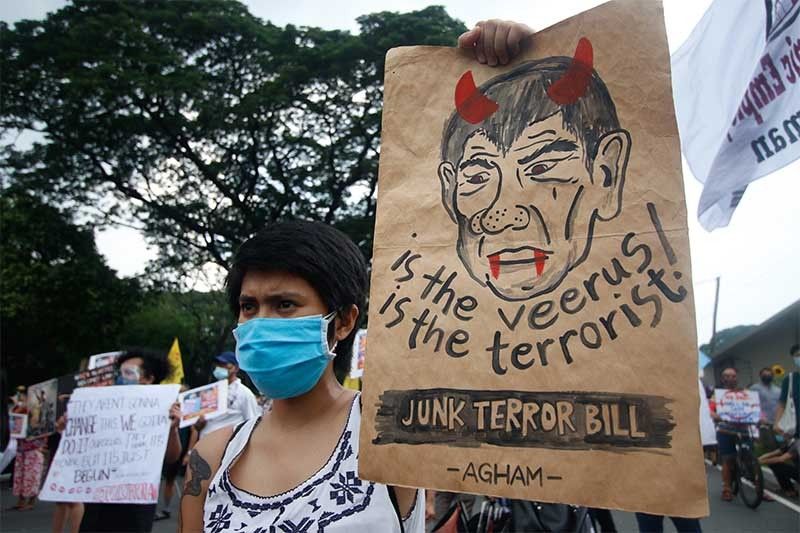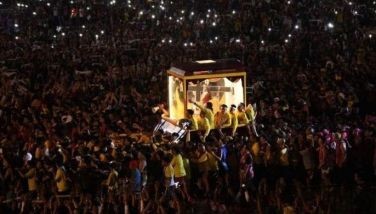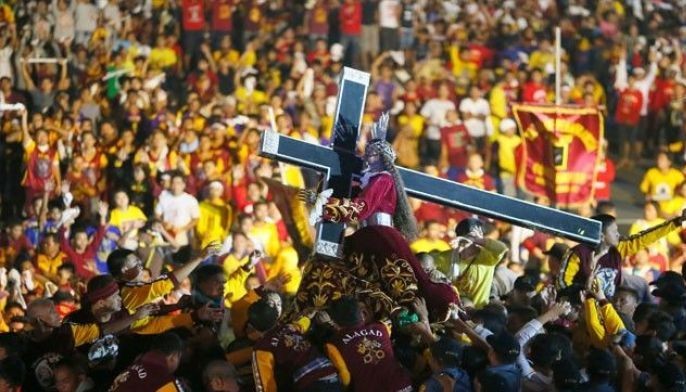As soon as SC opens, law professors fire petitions vs anti-terrorism law

MANILA, Philippines — As soon as the Supreme Court opened its gates on Monday morning — the first weekday since President Rodrigo Duterte signed the Anti-Terrorism Act of 2020 — law professors trooped to the tribunal to challenge the contentious new law.
Private lawyer Howard Calleja, University of the Philippines law professor Christopher Lao and Brother Armin Luistro, of the De La Salle University, submitted the physical copy of their petition assailing Republic Act 11467 or the Anti-Terrorism Act of 2020.
They were the first group of petitioners to fire a legal challenge against the new law, in a plea filed electronically on Saturday, less than 24 hours the Malacañang announced Duterte’s signing.
“While threats to our national security need to be addressed, the law, as crafted, is oppressive and inconsistent with our Constitution, hence, the petition. This fight against terrorism should not and should never be a threat to the fundamental freedoms of all peaceful Filipinos,” the petitioners, led by lawyer Howard Calleja, said.
Faculty from FEU-Institute of Law, led by its Dean Mel Sta. Maria, also asked the high court to issue a temporary restraining order to the executive branch to stop them from implementing several provisions of the anti-terrorism law. Their group became the third petitioners, following the filing of Rep. Edcel Lagman (Albay).
This includes a halt order against the implementation of the Sections 4, 5, 6, 7, 8, 9, 10, 11 and 12; (b) Sections 25, 26, and 27; and (c) Section 29 of the law. The provisions are on defining acts that fall under terrorism, and allowing the Anti-Terrorism Council (ATC) to designate terrorists and detention without judicial warrant of up to 24 days.
"The chilling effect that these provisions of law have on the exercise of the constitutional rights to freedom of speech, of expression, of the press, and of assembly should cause this Honorable Court to rule that these provisions are, as they are, unconstitutional," they said.
“If this law will be allowed to take effect, it will legitimize wrongdoings, allow transgressions to constitutional liberties, and give license for wrongdoers to act with impunity,” the petitioners also said.
Terrorism definition vague and broad
The FEU law professors assailed Section 4 of the new anti-terrorism law that seeks to define acts that should fall under terrorism.
With such “vague and broad” definition, “a nationwide transportation strike intended to stop public transport service... result in extensive interference with critical infrastructure” and could later be painted as having been done to intimidate the public—“so as to easily fall within the definition of terrorism.”
“It indubitably gives law enforcement agents and military personnel unbridled discretion to arbitrarily flex their muscle in carrying out its provisions merely on the basis of their ‘suspicion,’ intuition or understanding,” the petition read.
Sections 5 to 12 of the law that defines ancillary or secondary offenses—including inciting to commit terrorism—are also vague and overbroad, the law professors said. “Said provisions create a ‘chilling effect’ that would constitute prior restraint to, and stifle the free exercise of, such fundamental freedoms.”
They also pointed out that the ATC only need probable cause to designate an individual or group as a terrorist. The law is unclear on the quantum of evidence to be present and it does not give the suspected person an opportunity to defend one’s self before the council, the petitioners said.
They also challenged the constitutionality of Section 29 of the law that holds that law enforces may take custody of a person suspected of terrorism for 14 to 24 days before he or she may be brought to proper judicial authority.
“Mere suspicion cannot be the basis of a warrantless arrest,” the petitioners said.
Restriction on academic institutions
The law professors also argued that the new law interferes and restricts academic institutions on what and how to teach.
Due to the vagueness and overbreadth of the definition of terrorism, “it will inevitably result to the persecution and prosecution of free thoughts and ideas, including academic teachings and learnings, on constitutional rights, freedoms, and democracy as being indispensable components of the exercise of sovereignty.”
The professors said that academic institutions “should be able to teach that dissent and activism are part of democracy” but with the new law, this may be deemed as constituting terrorism.
They also noted that the Commission on Higher Education and the Department of Education have been included as support group of the ATC.
The law professors argued that the two agencies have “no rational connection to the implementation” of the law, “except to facilitate the power and ability of the Government to dictate upon academic institutions on what it and cannot teach and how faculty members should conduct their teaching.”
“The Anti-Terrorism Act imposes state regulations that will stifle academic freedom by threatening to punish thinking and critical exchanges against the government that may be considered as terrorism,” they added.
President Rodrigo Duterte signed the Anti-Terrorism Law on July 3 despite opposition from rights groups and civil society groups that it could be used to stifle human rights.
A petition against the law has been filed at the Supreme Court and other groups are preparing pleadings of their own.
Follow this page for updates. Photo courtesy of The STAR/Michael Varcas
National Security Adviser Hermogenes Esperon moves to block access to several websites, including news sites of alternative news orrganizations Bulatlat.com and Pinoyweekly.org.
In his letter to the National Telecommunications Commission, he only says the websites are "affiliated to and are supporting these terrorists and terrorist organizations."
No other basis to back up his allegation was cited in the letter.
Citing the designation of the CPP-NPA-NDF as terrorists, NSA Hermogenes Esperon moves to block access to several sites.
— Kristine Patag (@kristinepatag) June 22, 2022
In Esperon's letter to the NTC, he included news sites @bulatlat and @pinoyweekly; sites of other progressive groups RMP and Save our Schools. @PhilstarNews pic.twitter.com/nAzMITJFsS
The Commission on Human Rights says it "partly welcomes" the Supreme Court decision that some parts of the controversial Anti-terrorism Law are unconstitutional.
CHR spokesperson Jacqueline de Guia says the commission remains hopeful that the remaining contentious provisions of the law will be clarified by the high cour in the full text of the decision.
"At the same time, our commitment remains in guarding against possible human rights violations arising from the implementation of the anti-terror law. We steadfastly remind the government that countering terrorism and protecting human rights are not competing values but are, in fact, mutual and complementary," De Guia says in a statement.
The Supreme Court has deliberated and voted on the controversial Anti-Terrorism Act but the decision will be released "at the soonest time possible."
"However, considering that there were numerous issues resolved in the case, as well as the fact that each Justice had to vote on each issue, there is a need to accurately confirm and tally the vote of each Justice in order to ensure the correct resolution of the Court per issue," SC spokesperson Brian Hosaka says.
The Anti-Terrorism Council designates the National Democratic Front of the Philippines, the panel that negotiates for communist rebels during peace talks a terrorist organization.
Previous designation of the Communist Party of the Philippines and New People's Army led to the designation of supposed members of the CPP's Central Committee. Among those designated as terorrists were peace consultants.
Designation gives the Anti-Terrorism Council the authority to investigate and freeze the accounts of designated persons.
The Anti-Terrorism Council has designated 29 people, including alleged members of the Communist Party of the Philippines-New People's Army, as terrorists in two resolutions.
Designation allows the Anti-Money Laundering Council to freeze the assets of those on the list.
- Latest
- Trending


































